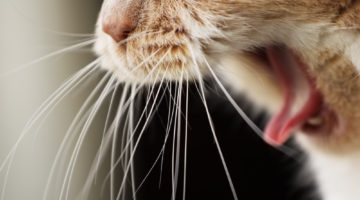Veterinary care isn’t cheap. Buying health insurance for your cat means you won’t have a tough decision to make if she gets sick.
Recently, a friend had to have her family cat euthanized because he’d been injured by a car and they couldn’t afford the surgery he needed. “We were heartbroken,” she says. “Sammy was only three years old, but my husband had his hours cut at work and we just didn’t have the money.”
Scenarios like this are increasingly common. An unstable economy coupled with the high cost of veterinary care means a lot of people find themselves in a quandary when their cats get ill or hurt unexpectedly and they can’t pay for treatment. Many end up having to surrender their beloved companions, or have them euthanized.
It doesn’t have to be like this. First of all, you can greatly reduce the risk of illness in your cat by implementing a preventive regime that includes quality nutrition and minimal vaccines. And buying pet insurance will cover a large percentage of the veterinary costs if your cat does get sick or injured.
Choosing a provider
A growing number of providers are selling health insurance for cats and other companion animals. Keep these questions in mind when shopping around:
- What will my cat be covered for and how much will it cost?
- Will the policy cover existing or hereditary conditions?
- Can I take my cat to any vet I like?
- Will the insurance cover any holistic treatments?
- Are there any age restrictions, and will premiums rise as my cat gets older, or when I use the coverage?
- What is the deductible? Will the provider pay the whole claim plus the deductible?
- What is the term of the policy?
- Are vaccination protocols determined by the insurance company or the veterinarian of my choice?
What kind of policy should I get?
If you think pet insurance is too expensive, think again. Premium payments for basic policies can run from as low as $15 to just over $20 a month – easily affordable and a very worthwhile investment in the future health of your cat (and your bank account). Deductibles and turnaround payment times vary depending on the company, and more comprehensive plans with wider coverage cost more, but insurance providers offer a selection of policies designed to best suit the individual needs of your companion and your budget.
For example, Pets Best Insurance has three plans to choose from. Each pays 80% (after deductible) up to the limits of the policy, which ranges from $2,500 per incident for the basic plan all the way up to $14,000 per incident for the premier plan. The policies cover illnesses, accidents and injuries as well as MRIs, CAT scans and X-rays, surgery, cancer treatment, hospitalization, and medication. Visits to after-hours emergency vets and specialists such as ophthalmologists, dermatologists and surgeons are also covered. For those who want more natural care, the company also covers acupuncture, chiropractic and holistic therapies.
VPI Pet Insurance offers two major medical plans and a choice of protection riders for routine procedures such as annual exams, dental cleaning, bloodwork, fecal tests, urinalysis and spay/neuter operations. And if you’re looking for a plan tailored to the needs of indoor or senior cats, kittens or purebreds, PetCare Pet Insurance has them. There’s even a policy for cats who live in rental accommodations; it incorporates third party coverage to cover the cost of any damage your cat may to do the apartment.
You might think insurance isn’t necessary if your cat is young and healthy. But illness and injury can strike at any time, often when you least expect it. Buying insurance while your cat is still well will give you the peace of mind of knowing she’ll be covered if something ever does happen.
Why is my vet so expensive?
You’ve probably wondered why it costs so much to take your cat to the vet. But when you consider how far animal medicine has come in the last couple of decades, it shouldn’t be a surprise.
Many diagnostic and surgical equipment and techniques once seen only in human hospitals are now also available to companion animals. Our feline friends have access to sophisticated treatment options unheard of in the past. They can now have everything from MRIs and endoscopy to cataract operations, laser surgery and kidney transplants.
As with anything else, higher quality care means higher costs, which is why insurance makes such good sense.
Insurance providers
Pets Best Insurance, www.petsbest.com
PetCare Pet Insurance, www.petcareinsurance.com
VPI Pet Insurance, www.petinsurance.com







No Comment